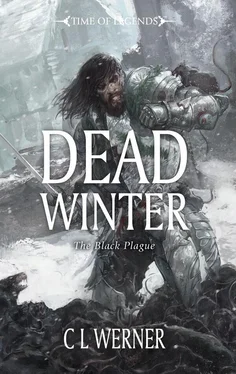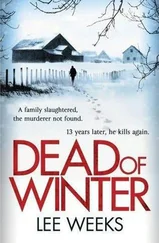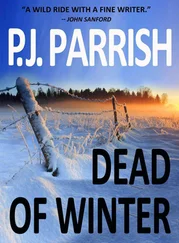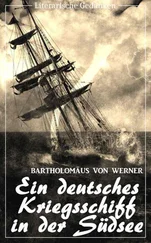C. Werner - Dead Winter
Здесь есть возможность читать онлайн «C. Werner - Dead Winter» весь текст электронной книги совершенно бесплатно (целиком полную версию без сокращений). В некоторых случаях можно слушать аудио, скачать через торрент в формате fb2 и присутствует краткое содержание. Год выпуска: 2012, ISBN: 2012, Издательство: Games Workshop, Жанр: Фэнтези, на английском языке. Описание произведения, (предисловие) а так же отзывы посетителей доступны на портале библиотеки ЛибКат.
- Название:Dead Winter
- Автор:
- Издательство:Games Workshop
- Жанр:
- Год:2012
- ISBN:9781849701518
- Рейтинг книги:4 / 5. Голосов: 1
-
Избранное:Добавить в избранное
- Отзывы:
-
Ваша оценка:
- 80
- 1
- 2
- 3
- 4
- 5
Dead Winter: краткое содержание, описание и аннотация
Предлагаем к чтению аннотацию, описание, краткое содержание или предисловие (зависит от того, что написал сам автор книги «Dead Winter»). Если вы не нашли необходимую информацию о книге — напишите в комментариях, мы постараемся отыскать её.
Dead Winter — читать онлайн бесплатно полную книгу (весь текст) целиком
Ниже представлен текст книги, разбитый по страницам. Система сохранения места последней прочитанной страницы, позволяет с удобством читать онлайн бесплатно книгу «Dead Winter», без необходимости каждый раз заново искать на чём Вы остановились. Поставьте закладку, и сможете в любой момент перейти на страницу, на которой закончили чтение.
Интервал:
Закладка:
‘Let’s go,’ the rat-catcher decided, checking to see that the cowhide pouch where he put the tails of his quarry was secure. People were becoming desperate enough to steal just about anything, and from just about anyone.
The two men hurried down the alley, the terriers trotting along beside them. Once they were in Tanner’s Lane, Walther could see that a large crowd had gathered about one of the street’s many tanneries. Even from a distance, the angry murmur of the crowd had an ugly and murderous quality about it.
‘Quick,’ Walther hissed under his breath, breaking into a run. The crowd was showing every sign of degenerating into a mob. Before that happened, he wanted to find out why. Racing ahead of Hugo, who had managed to trip over one of the terriers, Walther was in time to see a body being carried from the tannery by several men in the leather aprons of tanners. Like the pallbearers, the body lying upon an improvised litter of uncured horsehide was garbed in a long leather apron and carried the pungent stink of a tanner. The neck of the corpse was twisted and savaged, a great mess of torn skin and bloodied flesh.
‘It was them that did it,’ a voice from the mob snarled.
‘They cut old Erwin’s throat,’ growled another.
Other angry shouts rose from the mob. Some of the men attacked the little fence outside the tannery, pulling out wooden stakes to employ as makeshift cudgels. Others pried stones from the street, brandishing them in their fists as though wielding Count Artur’s Runefang.
‘They did it!’ a nameless voice cried out. ‘They murdered Erwin because he was well and they weren’t!’
‘Sick in flesh, sick in soul!’ cried out another, and the shout was taken up by others in the mob. Yelling and screaming, the crowd drifted away from the tannery, marching down the lane towards a little stone house with a red cross marked upon the door.
Walther knelt beside the now forgotten corpse, the dead man in whose name the mob had abandoned itself to violence. He folded the cold hands across the body’s breast, then leaned forwards and examined the neck.
‘They’re crazy!’ Hugo exclaimed, joining Walther by the body. ‘They’ll kill somebody!’ he added, gesturing with his pole at the amok mob.
‘Right as usual,’ Walther said, peering intently at the gashes in the tanner’s throat.
‘Aren’t we going to try to stop them?’ Hugo asked.
Walther gave his apprentice a piercing stare. ‘They won’t listen to reason. Not now. When faced by a mob like that, you have three choices. Become part of it, be a victim of it, or stay the hell out of the way.’
Hugo turned his head, watching as the mob threw torches onto the roof of the house. ‘Maybe… maybe they really did kill this man,’ he tried to convince himself. ‘Maybe what they’re doing is right.’
‘They’re murderers,’ Walther told him. He pointed his thumb at the tanner’s throat. ‘This wasn’t cut. It was bitten. Gnawed.’
Hugo stared in shock at the body, unable to believe what he’d heard. ‘Bitten? We’re in the middle of Nuln! What kind of animal would be able to do this in the middle of the city and sneak away?’
The rat-catcher didn’t answer him. He was staring instead at the three little black dogs. Each of the ratters was trembling, their fierce little hearts filled with a conflicting mix of eagerness and fear. Their ears were flat against their heads, their bodies tense, poised for the attack. Despite the heavy odours of the tannery, the dogs had caught the scent of the man’s killer. What was more, they recognised it.
Walther rose to his feet and whistled for the dogs. Despite the evidence of his eyes, he wasn’t ready to believe. It was insane to even consider such a thing. If he was right, then Erwin had been killed by a rat, his throat gnawed to bits by the chiselled fangs of an enormous rodent, a monster the size of a full grown sheep! He wasn’t ready to permit the existence of such a horror!
Yet, as he walked away from the tannery, as he turned his back on the little stone house engulfed in flames, the rat-catcher’s mind mulled over what such a nightmarish creature could mean to him.
There was a lot of money to be made catching normal rats. How much more might there be in hunting down a giant?
Middenheim
Kaldezeit, 1111
Middenheim was unique among the city-states of the Empire, rising high above the forests and meadows of Middenland. The entire city was built upon the flattened stump of rock the dwarfs called Grazhyakh Grungni — Grungni’s Tower. Men called it the Fauschlag and the Ulricsberg, believing that once it had been a great mountain sacred to the god Taal. God of the wild places, Taal governed nature with his wife Rhya and a congress made up of all the animals. Because of the creature’s craft and guile, Taal expelled the wolf from this congress, an act which incensed Ulric. To bring peace between the gods, Taal gave his sacred mountain to his brother. In a fit of rage, Ulric struck the top of the mountain with his axe, shattering it and leaving the flattened stump behind.
The dwarfs had helped the ancient Teutogen tribes to settle upon the flattened peak, providing the humans with a natural fortress unrivalled in all the Empire. Over the centuries, four great causeways were built, rising from the plains below to converge upon Middenheim from each direction. Mighty walls were erected about the perimeter of the stump, forming an impregnable barrier against any enemy. For over a thousand years, Middenheim had stood inviolate, a bastion for humanity in the wild northlands.
Prince Mandred toured the battlements of the Ulricsberg, feeling the brisk mountain wind whip through his fur cloak. He often walked the battlements, enjoying the view the walls afforded. He could look out across the sprawl of Middenland, picking out the keeps and villages scattered across his father’s forested realm. Early in the morning, the mist obscured everything, making it seem as though the city was adrift upon a sea of cloud. Then would come that magical moment when the rising sun burned away the fog and the realm suddenly stood revealed before his eyes.
Normally, Mandred found that moment the most enchanting vision in the world, but today the sight was blemished, corrupted by feelings of guilt and shame. As the fog burned away, he could see the squalid cluster of tents and shacks sprawled at the base of the Ulricsberg between the northern and eastern causeways. Ar-Ulric’s prediction that the plague would spread had been borne out. Thousands of refugees had abandoned their homes, fleeing before the approach of the dreaded Black Plague. From places as far apart as Solland and Nordland they came, hoping to escape the creeping contagion. Some came because of the perceived strength and invulnerability of the Ulricsberg, many more came because Middenheim was the holy city of Ulric and they hoped to gain their god’s protection by being close to his great temple and the Sacred Flame.
Hope had drawn these people here, but that hope had been betrayed by Graf Gunthar. Mandred felt a cold rage building inside him every time he thought about his father’s cruel decree. There was enough room atop the Ulricsberg to shelter the refugees. The springs deep within the mountain provided Middenheim with more than enough water. True, food would be a problem, but through careful rationing that obstacle could be overcome. Many of the noblemen could do with skipping a few meals.
It galled Mandred to think of his father as such a callous tyrant. Even from the height of the city walls, the squalor and misery of the shantytown was obvious. The refugees had been condemned to a slow and shameful death, a death of neglect and starvation. The toll once the snows came would be hideous.
Читать дальшеИнтервал:
Закладка:
Похожие книги на «Dead Winter»
Представляем Вашему вниманию похожие книги на «Dead Winter» списком для выбора. Мы отобрали схожую по названию и смыслу литературу в надежде предоставить читателям больше вариантов отыскать новые, интересные, ещё непрочитанные произведения.
Обсуждение, отзывы о книге «Dead Winter» и просто собственные мнения читателей. Оставьте ваши комментарии, напишите, что Вы думаете о произведении, его смысле или главных героях. Укажите что конкретно понравилось, а что нет, и почему Вы так считаете.











